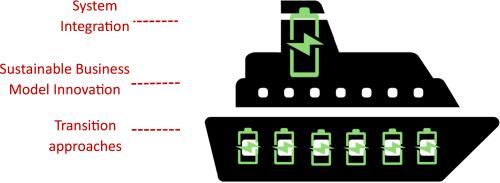Batteries for sustainable shipping: Current status and potential roles
IF 16.3
1区 工程技术
Q1 ENERGY & FUELS
引用次数: 0
Abstract
Due to international commitments to reduce emissions in the shipping sector, new fuels and drivetrains are being explored. However, the potential role of batteries is often overlooked in strategic studies. We fill this gap through a broad literature study of grey and academic literature, complemented with three deep dives into Systems Engineering, Sustainable Business Models, and Transition approaches. Battery electric systems are currently the most frequently applied among alternative fuel-drivetrains, although they account for a low percentage of energy use. They are the preferred technology for zero-emission vessels. However, they mostly find application in small to medium hybrid vessels and support functions. Key drivers are regulation and policies, the increase in energy density, and the decrease in costs. Sectoral barriers include infrastructure, the capital intensity of vessels, cost-driven performance, weak governance, and international operations. Challenges for battery applications include integration in a ship's energy system, battery safety, charging, decision support on feasible applications, and establishing viable renewables-based port energy communities that integrate services to and from battery systems on berthing ships. Due to their diversity, versatility, and current application, batteries are likely to become more broadly applied on small to medium-sized vessels, and as enabling technology in hybrid applications and support functions. They thereby have the potential to influence the transition in the sector. Considering the diversity in batteries, shipping segments, and contexts, this will result in many small steps forward. Fast development requires strong policy support. Inherent uncertainty regarding fuels and drivetrains is best countered by robust decision-making in the sector, and can include battery usage.

可持续航运的电池:现状和潜在作用
由于国际社会承诺减少航运业的排放,人们正在探索新的燃料和动力传动系统。然而,在战略研究中,电池的潜在作用往往被忽视。我们通过对灰色文献和学术文献的广泛研究来填补这一空白,并辅以对系统工程、可持续商业模式和过渡方法的三次深入研究。电池电力系统是目前在替代燃料驱动系统中应用最频繁的,尽管它们占能源使用的百分比很低。它们是零排放船舶的首选技术。然而,它们主要应用于中小型混合动力船舶和支持功能。主要驱动因素是监管和政策、能源密度的增加和成本的降低。行业壁垒包括基础设施、船舶资本密集度、成本驱动型绩效、治理不力和国际运营。电池应用面临的挑战包括船舶能源系统的集成、电池安全、充电、可行应用的决策支持,以及建立可行的基于可再生能源的港口能源社区,将停泊船上电池系统的服务集成在一起。由于其多样性、通用性和当前的应用,电池可能会在中小型船舶上得到更广泛的应用,并作为混合应用和支持功能的使能技术。因此,它们有可能影响该部门的转型。考虑到电池、运输部门和环境的多样性,这将导致许多小的进步。快速发展需要强有力的政策支持。燃料和动力传动系统的固有不确定性最好通过强有力的决策来解决,包括电池使用。
本文章由计算机程序翻译,如有差异,请以英文原文为准。
求助全文
约1分钟内获得全文
求助全文
来源期刊

Renewable and Sustainable Energy Reviews
工程技术-能源与燃料
CiteScore
31.20
自引率
5.70%
发文量
1055
审稿时长
62 days
期刊介绍:
The mission of Renewable and Sustainable Energy Reviews is to disseminate the most compelling and pertinent critical insights in renewable and sustainable energy, fostering collaboration among the research community, private sector, and policy and decision makers. The journal aims to exchange challenges, solutions, innovative concepts, and technologies, contributing to sustainable development, the transition to a low-carbon future, and the attainment of emissions targets outlined by the United Nations Framework Convention on Climate Change.
Renewable and Sustainable Energy Reviews publishes a diverse range of content, including review papers, original research, case studies, and analyses of new technologies, all featuring a substantial review component such as critique, comparison, or analysis. Introducing a distinctive paper type, Expert Insights, the journal presents commissioned mini-reviews authored by field leaders, addressing topics of significant interest. Case studies undergo consideration only if they showcase the work's applicability to other regions or contribute valuable insights to the broader field of renewable and sustainable energy. Notably, a bibliographic or literature review lacking critical analysis is deemed unsuitable for publication.
 求助内容:
求助内容: 应助结果提醒方式:
应助结果提醒方式:


